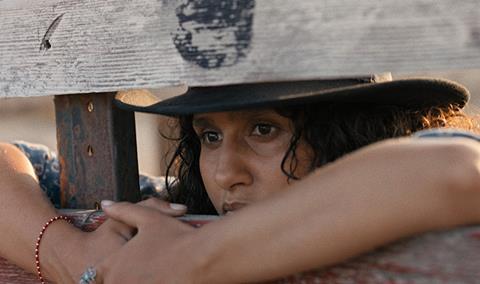Emma Benestan directs an atmospheric genre hybrid set in a French bull-riding community

Dir/scr: Emma Benestan. France/Belgium/Saudi Arabia 2024. 98mins
A young woman takes toxic masculinity by the horns in Animale, a clunky mystery/horror drama with a dash of cattle-wrangling Western, Mediterranean style. As this might suggest, hybrid is very much the term for Emma Benestan’s second feature – not least in terms of the metamorphosis theme that is its most lurid aspect. Set in the bull-racing culture of the Camargue region of southern France, this is a handsomely executed genre piece from the Algerian-French writer-director of 2021’s Fragile (a.k.a.Hard Shell, Soft Shell), also known as editor to Abdellatif Kechiche.
Over-familiar premise
Animale boasts visual confidence to spare and a compelling, energetic lead performance from Oulaya Amamra, who previously appeared in Fragile. Disappointingly, though, the film never lives up to its bold scene-setting, falling into a pattern of obviousness which will leave viewers feeling several steps ahead of its heroine right up to a loopy ending. Horror fans with a penchant for feminist narratives might give Animale some niche presence, but the over-familiar premise and narrative clunkiness may see it struggle beyond that.
The milieu is certainly striking – the marshlands of the Camargue region near Arles, famously celebrated on screen in Albert Lamorisse’s 1953 White Mane. Twenty-something Nejma (Amamra, a charismatic regular in French cinema since her career-making lead in Houda Benyamina’s 2016 Divines) works on a cattle ranch, and is training to be a bull runner in local events where contestants try and catch trophies while dodging angry cattle. It is an unusual occupation for a woman, the film makes clear, but Nejma is made of tough stuff, shrugging off the ostensibly fond sexist banter of her male peers. Her mother (a sympathetic turn from Marinette Rafai) is concerned for her – as well she might be, as Nejma is surrounded by macho boors. The exceptions are ranch boss Léonard (Claude Chaballier), a gruff but benign patriarch, and his gay son Tony (Damien Rebattel), currently recovering from a leg wound.
Nejma makes a hesitant but competent debut in the ring, to general approval from the lads. But things take a dark turn when she accompanies them on a night ride and is left alone, drunk and high on pills, to take her chances in a field of bulls. She wakes the next morning, unsure what has happened – although viewers won’t need the film’s semi-hallucinatory flashbacks to figure it out. Soon, mysterious animal innards are being found in the vicinity – and gored human bodies. And as Nejma increasingly identifies with the bulls’ point of view, she starts changing in ways rather overtly signalled by the title.
There is little in the overall narrative that is not already somewhat familiar, like the topic of the young woman determined to break into a traditionally male sport, treated more matter-of-factly in Lola Quivoron’s 2022 dirt-racing movie Rodeo; while uncanny transformation seems to be in vogue in current French cinema, given Cannes hits Titane and The Animal Kingdom. Where Animale is indisputably strong is in sketching the torocentric culture of the Camargue – its famous white horses also feature prominently – and the masculine cult of taking on black bulls. The expertise of the runners and riders is dazzlingly evoked in the opening sequence, where Animale is closest to a western, and in the fight scenes, where swift, fluid camerawork shows off the participants’ – and the film-makers’ – agility and expertise.
As for Benestan’s take on the sport itself – which, unlike Spanish bullfighting, does not involve the killing of animals - she shows admiration for those who take part, but also, like Nejma, feels sympathy for animals that may suffer. Even so, viewers with animal right sensibilities may feel reluctant to engage wholeheartedly.
Although the narrative ultimately goes off the rails, Amamra’s magnetically pugnacious lead gives Animale a consistent pull, while director Benestan’s work with cinematographer Ruben Impens – who also shot Titane – is bustling and kinetic, and intimate when it needs to be. Costume designer Fabienne Menguy also scores with a milieu-specific range of dazzlingly coloured shirts that is one of the film’s visual trump cards.
Production company: June Films
International sales: Film Constellation chloe@filmconstellation.com
Producer: Julie Billy, Naomi Denamur
Cinematography: Ruben Impens
Production design: Eve Martin
Editor: Clémence Diard
Music: Yan Wagner
Main cast: Oulaya Amamra, Damien Rebattel, Vivien Rodriguez, Claude Chaballier, Marinette Rafai















![[L-R]: Amanda Villavieja, Laia Casanovas, Yasmina Praderas](https://d1nslcd7m2225b.cloudfront.net/Pictures/274x183/6/4/1/1471641_pxl_20251224_103354743_618426_crop.jpg)








